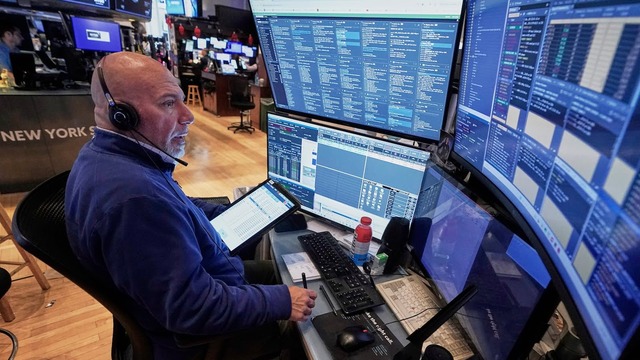
A digital stock board displaying Japan’s Nikkei index is visible through a vehicle window at a Tokyo securities firm on Monday, February 3, 2025. (AP Photo/Eugene Hoshiko)
Wall Street faced a turbulent start on Monday as investors reacted to President Donald Trump’s new tariffs, fearing an economic downturn. However, markets regained some ground after Mexico announced a temporary delay on the trade measures, easing some concerns.
The S&P 500 closed down 0.8%, while the Dow Jones Industrial Average dropped 122 points (0.3%). The Nasdaq suffered the biggest hit, falling 1.2%. Early trading saw much steeper declines, with the S&P 500 briefly down nearly 2% and the Dow losing as many as 665 points before rebounding.
Tech giants and industries vulnerable to interest rate hikes bore the brunt of the sell-off. The tariffs, which targeted imports from Canada, Mexico, and China, raised fears that household expenses—such as groceries and electronics—could increase, pushing inflation higher. A persistent rise in inflation could prevent the Federal Reserve from lowering interest rates, a move it had begun last September to support the economy.
Investors breathed a sigh of relief after Mexican President Claudia Sheinbaum revealed that her country had secured a one-month pause on the tariffs following discussions with Trump. This led to a midday recovery in U.S. stocks, with the Dow briefly turning positive. Later in the evening, Canadian Prime Minister Justin Trudeau also announced a 30-day delay on tariffs after speaking with Trump, fueling hopes that the tariffs might be a negotiation tactic rather than a permanent policy.
Many investors had assumed Trump’s aggressive trade rhetoric during his campaign was primarily a strategy to gain leverage in talks with trade partners. However, Monday’s developments left markets uncertain about his true intentions. The initial fear of an escalating trade war rattled investors, who worried about the broader impact on global economies, particularly the United States.
Brian Jacobsen, chief economist at Annex Wealth Management, highlighted the potential regional impact. "Living in the Midwest, I might feel the trade war soonest and most," he said, referring to how vital Canadian crude oil imports are for U.S. gasoline production. Oil prices fluctuated in response, with U.S. crude briefly spiking from $72.53 per barrel to nearly $75 before slipping back toward $72.
Trump acknowledged that Americans might feel "some pain" from the tariffs but insisted the policy was necessary to "make America great again." He also hinted at extending the import taxes to the European Union and possibly the United Kingdom.
The stock market’s volatility reflected deep uncertainty about how long the trade war might last. Some analysts believed Trump’s sensitivity to stock market performance could push him to reconsider his approach. Solita Marcelli of UBS Global Wealth Management noted that continued stock declines and market instability could force a policy shift.
Certain industries were hit hard by the tariff news. Constellation Brands, which imports Modelo and Corona beers, fell 3.5%. Best Buy, heavily reliant on foreign-made electronics, dropped 2.4%. Jack Daniel’s parent company, Brown-Forman, which exports liquor to Canada, saw a 3.3% decline.
Overall, the S&P 500 shed 45.96 points, closing at 5,994.57, while the Dow settled at 44,421.91 after dropping 122.75 points. The Nasdaq sank 235.49 points, finishing at 19,391.96.
As investors sought safer options, government bonds became a refuge. The rally in bond prices pushed the 10-year Treasury yield down to 4.53% from 4.55% on Friday. Short-term yields, however, rose as expectations for Federal Reserve rate cuts dwindled. The two-year Treasury yield climbed to 4.25% from 4.21%.
The AI sector also felt the heat. Nvidia, a major player in artificial intelligence, dropped 2.8%. The stock had already faced pressure last week after reports emerged of a Chinese competitor developing a comparable AI model without using expensive U.S. chips.
Trump’s tariff policy overshadowed other significant economic events expected this week, including job market data and earnings reports from major corporations like Alphabet and Amazon. Global stock markets also suffered losses, with London’s FTSE 100 down 1%, Paris’s CAC 40 slipping 1.2%, and Germany’s DAX falling 1.4%. Asian markets saw sharper declines, with South Korea’s Kospi losing 2.5% and Japan’s Nikkei 225 tumbling 2.7%.
As markets remain on edge, all eyes are on the next steps in U.S. trade negotiations. Investors will be watching closely to see whether Trump’s tariff threats are a long-term strategy or a short-term bargaining tool.















